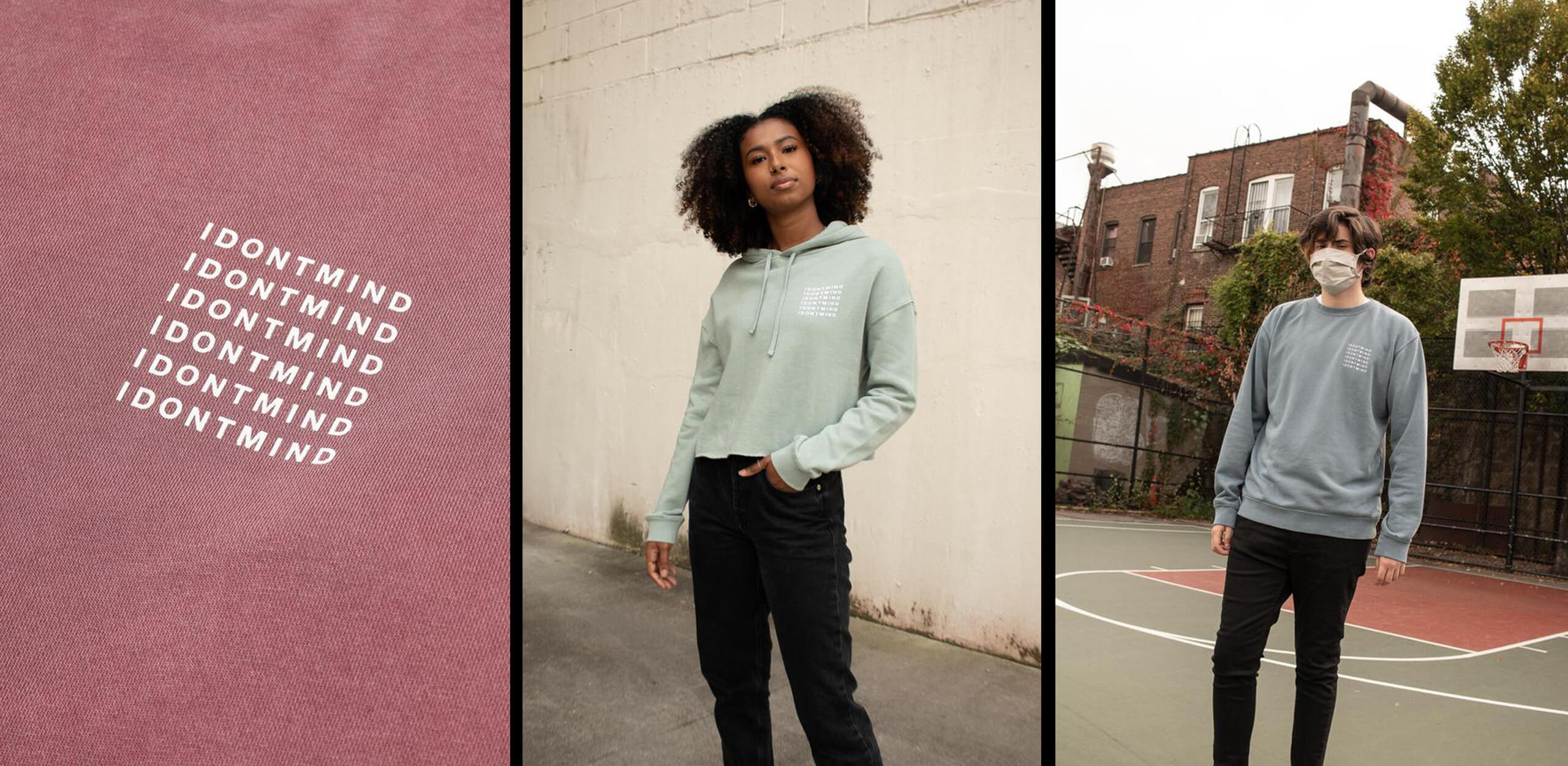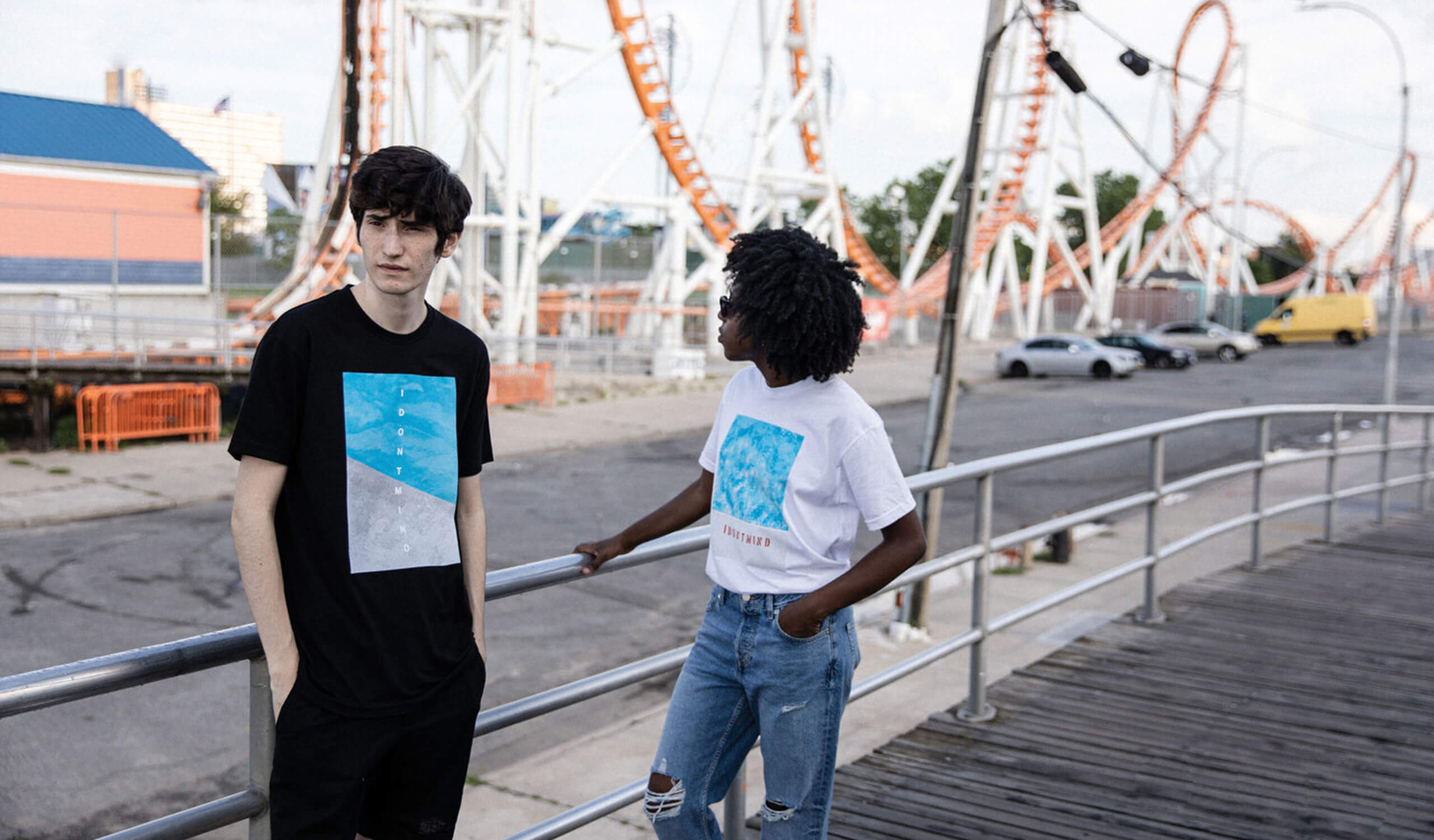June 4th, 2021
“Oh, I don’t mind,” how one simple phrase became a movement.
Mental health and looking after our mind is something that as a society we are all talking about more and more, and there is one brand in particular that has put mental health at the heart of what it does.
What might otherwise come off as a retail brand selling merchandise, IDONTMIND is a brand that’s looking to open up a conversation around mental health through its hats and t-shirts. Its seemingly unorthodox name and loose branding hints at a vernacular tone that makes it all the more ‘unbranded’. Founded in 2017 by actor Chris Wood and co-founder Edward Schmit, on their website, in a few short lines, they capture their whole initiative:
People talk more about what they’re wearing than what they’re feeling […] When you shop at IDONTMIND, you’re both raising money for our cause and fighting stigma out in the open. A compliment—“I like your shirt, what does it mean?”—suddenly turns into an opportunity to discuss mental health.

From this point of reframing, IDONTMIND can be better defined as a mental health campaign secretly disguised as a lifestyle brand. It is an official campaign of Mental Health America, a community-based nonprofit dedicated to addressing the needs of those living with mental illness and promoting the overall mental health of all, and 100% of proceeds support the IDONTMIND campaign at Mental Health America. It is a concept similar to the online fundraising platform Bonfire, founded in 2012, and their t-shirt campaigns where every piece of merchandise sold opens up a dialogue. Their site allows you to filter t-shirts by cause including categories related to mental health awareness and suicide awareness amongst many others. No doubt, a reflection of the times we’re living in.
In an interview with Thrive Global in October of last year, Wood speaks to how the brand’s initiative came about starting with the loss of his father to mental illness. “About eight and a half years ago, I began this impossibly tough year that left me juggling grief and depression.” Like his father before him, a silent shame prevented him from acknowledging the problem. For years, Wood coped with his distress by not talking about it, indulging in a cycle of overwork and self-neglect until one day, a simple phrase made all the difference.
”Oh, I don’t mind, I can talk about it.” […] just starting with something that was open, and that said, “No, I’m not going to let this weigh me down anymore. I’m going to speak about it”— changed everything.
Other phrases like “Your mind matters” donned on hats and t-shirts in a humble selection of fonts and colours serve as silent reminders to combat a silent stigma. One shirt, the sentence tee, packs a punch: “IDONTMIND being my authentic self,” “IDONTMIND reminding myself it’s okay to not be okay,” “IDONTMIND being patient with myself.” Across a variety of sweaters, socks, and other accessories, the message is clear: we will not let up!

Besides making a purchase, another point of connection for consumers to engage with the brand is in the use of the online Journal on their website and the way its articles on mental health topics are actively yet seamlessly incorporated into their social media channels. This provides an added advantage alongside potential t-shirt collaborations (their most recent with Olympian Laurie Hernandez) which might otherwise be more restrained to branding guidelines and require more time to organise and produce.
In contrast, its regularly featured articles are an exercise in staying relevant and flexible, challenging the brand in keeping current with the issues their audience cares about. The most recent example of this comes in their response to the Black Lives Matter movement and the killing of George Floyd. Alongside an official statement from their affiliate Mental Health America, the Journal featured an article related to race-based trauma from a black, female psychologist in the industry; black voices in mental health to follow on social media; as well as therapy and wellness resources for black readers struggling to cope.
By using the Journal, they are able to share their platform with others in the wellness community and centre other vulnerable groups, addressing a parallel stigma to that of mental illness surrounding conversations of racism (cited as another form of “disease” in one article). This kind of solidarity is important because it challenges the stagnant role that brands traditionally play. It is a call to action that changes perspective lines, inviting others to see themselves as having their own purpose in the brand’s ongoing campaign.

This consistent effort and proactive approach is a careful practice in holding themselves accountable. More recently, they have even started accepting personal story submissions from readers on their own mental health journey. By finding new ways to reach out into the community to collaborate, they share in the risk, compromise and commitment to their purpose.
“People talk more about what they’re wearing than what they’re feeling.” Why is that? According to Mental Health America’s 2020 report, youth mental health is worsening, with major depression between the ages of 12 to 17 increasing. Meanwhile, more adults are experiencing thoughts of suicide with those between the ages of 19 to 25 being the most at risk. This is why what IDONTMIND stands for is so incredibly important, as while the brand doesn’t offer any further clues as to why mental health is getting worse, what’s certain is that its customers are the rightful protagonists in starting the conversation, and it is a conversation that is most certainly needed.
Written by Aliyah Campbell, Freelance Writer.
DISCLAIMER: We endeavour to always credit the correct original source of every image, however if you think a credit may be incorrect, please contact us at rb@hatchedlondon.com.




